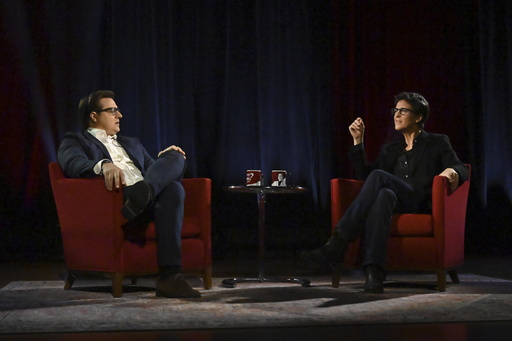NEW YORK (AP) — MSNBC is inviting its fans to a one-day “Democracy 2024” event this September with live panels and a dinner with stars like Rachel Maddow, Chris Hayes and Ari Melber, part of the company’s entrance into the burgeoning field of events journalism.
Live events are a growing business for many news outlets, forced to think of different ways to make money with readership, viewership and advertising revenue declining. MSNBC has ramped up its effort this year with the help of creative director Luke Russert.
The journalism-centered events business has grown in fits and starts before accelerating in recent years. It is particularly robust in Washington, with the Post, Politico, Semafor, Punchbowl News and Puck all active.
“The fact that we’ve seen others in the industry host similar events, that’s been a bit of a precedent,” MSNBC President Rashida Jones said. “One of the benefits of our brand and our content is that there are a lot ways to engage with it.”
Growth of an industry adjacent to journalism
When Semafor started two years ago, co-founder and CEO Justin B. Smith made it a central part of the business; the company held eight events before publishing its first article. He calls it “live journalism,” and it was quickly profitable through the sale of sponsorships.
Semafor will hold about 70 or 80 events this year, with the centerpiece being the World Economy Summit in April, an annual meeting Smith has positioned as Davos on the Potomac River.
“It’s a great place to make news and a great place to make money,” he said.
Before Semafor, Smith built up the live events business at Bloomberg and the Atlantic, the latter instrumental in the popular Aspen Ideas Festival. The New Yorker magazine has also built an influential festival that mixes news and culture.
Overall, events journalism didn’t catch fire quickly, in part because organizing them was a skill in short supply at news outlets, Smith said. There were also some notable missteps: A reporter for The New York Times quit under pressure in 2019 after using a racial slur in a Times-sponsored student trip to Peru; the newspaper doesn’t host such trips anymore.
And The Washington Post was embarrassed in 2009 when it was revealed it had planned to charge lobbyists as much as $250,000 to attend an off-the-record salon, hosted by its publisher, with newsmakers and journalists.
That’s a clear ethical transgression for selling access. But Thomas Rosenstiel, a journalism professor at the University of Maryland, said he didn’t see a problem with an event like MSNBC’s.
“If the product is civic knowledge and debate, that’s what news organizations do,” Rosenstiel said. “That’s the business that they’re in. It’s just the delivery system is different.”
MSNBC dips its toe in
MSNBC’s “Democracy 2024” has faint echoes of the annual “BravoCon” run by its corporate cousin, although in this case news personalities are replacing real housewives and Andy Cohen. Last year’s 3-day “BravoCon” in Las Vegas cost fans $550 for entry, with a special VIP package of $1,200 that included the right to move to the front of the line at the bar.
“We do not have that feature,” MSNBC’s Jones said.
Ticket prices for the Sept. 7 MSNBC day at the Brooklyn Academy of Music, which also includes a film screening and reception, start at $119 per person, the network said on Monday.
Hayes, Jen Psaki, Joy Reid, Alex Wagner, Andrea Mitchell and Katy Tur will lead one panel discission on campaign issues, and stat man Steve Kornacki will break down the latest poll results. Maddow, Melber, Lawrence O’Donnell, Stephanie Ruhle, Michael Steele, Alicia Menendez and Symone Sanders Townsend will run a second panel.
Dipping its toe in the business, MSNBC held an invite-only event in Washington before the State of the Union address. Hayes went on a multi-city tour surrounding his “Why is this Happening?” podcast, and was joined by Maddow for a discussion at New York’s Town Hall.
“Any opportunity I can have in front of a live crowd I love,” Hayes told The Associated Press. “I’m a theater kid at heart. I probably feel more comfortable in a room with actual people in the audience that I do on live TV.”
Hayes said it offered an unparalleled feedback mechanism.
“You can tell when people are with you, when you’ve lost people,” he said. “You can tell when people are laughing, when they’re sighing in exasperation about something you’ve told them. You can navigate that. One of the hardest things when I started doing TV was not having that.”
___
This story has been updated to correct the title of an event held by Semafor. It is the World Economy Summit, not the World Economic Forum.
___
David Bauder writes about media for The Associated Press. Follow him at http://twitter.com/dbauder.
This website uses cookies so that we can provide you with the best user experience possible. Cookie information is stored in your browser and performs functions such as recognising you when you return to our website and helping our team to understand which sections of the website you find most interesting and useful.
